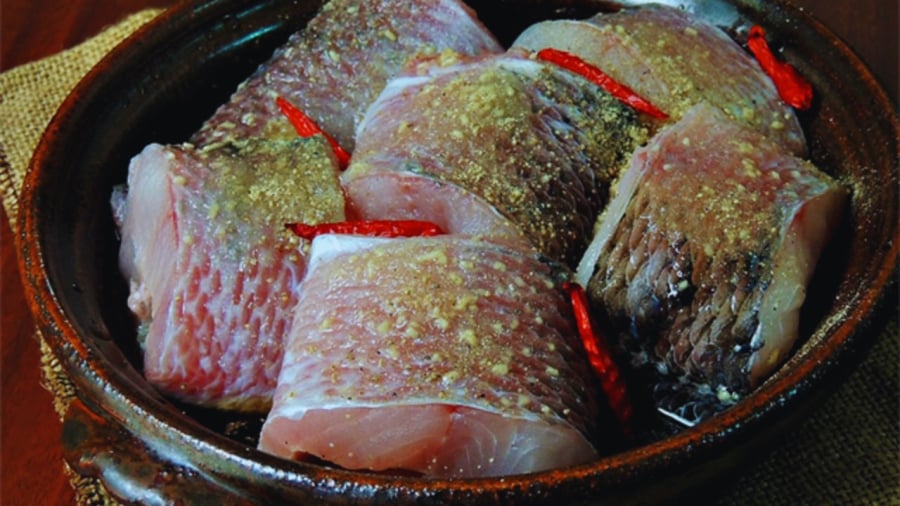## How to Choose Fresh Fish
When selecting fresh fish, look for firm flesh that bounces back when pressed. The scales should be bright and intact, firmly attached, and free from any discharge. Fresh fish has clear, translucent eyes and bright red gills, free from discolouration.
Spoiled fish has a distinct pungent odour. Its eyes appear cloudy and sunken, and its flesh is soft and flaccid. The gills are a dull grey, and the fish may be slimy. For larger fish sold in sections, the cut should be pale without any blood or dark red bruising.

Guide to Choosing Fresh Fish
## Tips for Marinating Fish to Enhance Flavour and Reduce Fishy Odour
Before marinating, it’s essential to clean the fish thoroughly:
– For saltwater fish, choose fresh specimens with clear eyes, red gills, and firm, elastic flesh. Rinse the fish with salt to remove any slime and odour.
– Freshwater fish tend to have a stronger muddy odour in addition to the fishy smell. A salt rinse can significantly reduce this.
– For snakehead fish, remove the skin and scales, paying close attention to the two pungent scales near the head. Also, remember to remove the slimy thread along the spine.
– After cleaning, rinse the fish with clean water, then use ginger wine to wash both the inside and outside of the fish. Next, place the fish in a colander and pour over with 70-80-degree water to tighten the skin and remove any remaining slime. Ensure the fish is well-drained, and never soak it in hot water, as this will make the flesh mushy.

Tips for a Delicious, Odour-Free Marinade
Depending on the recipe, a few drops of lemon juice can be added to the marinade to neutralise any fishy odour.
When cooking, some fried dishes with sweet and sour sauces or fish served with fish sauce can benefit from the addition of ginger to mask any fishy notes (as in congee, fried pike with sweet and sour sauce, or mudfish served with ginger fish sauce). After preparation, be sure to pat the fish dry before cooking to reduce odour further.
For fried fish, ensure the fish is thoroughly drained, then coat it with a dry coating (tapioca starch, wheat flour, or crispy coating mix) before frying.
For stewed dishes, marinate the fish well with seasonings and colouring to ensure the flavours penetrate the flesh. When stewing, avoid stirring or mixing vigorously, and do not let the broth boil aggressively, as this may cause the fish to break apart.
For boiled or steamed dishes, serve the fish as soon as it is cooked. Overcooking will cause the fish to fall apart, and the flesh will dry out, losing its sweetness.

Effective Fish Odour Removal Methods for Delicious Cooking
## Additional Tips for Removing Fish Odour
– **Vinegar or Lemon Water Rinse:** Soaking the fish in diluted vinegar or lemon water and then thoroughly rinsing it is an effective way to neutralise any fishy odour.
– **Salt:** Add a little salt to water (just enough to make it slightly salty) and soak the fish for 5-10 minutes. Alternatively, rub the fish with salt directly to clean it effectively.
– **Ginger:** Fresh ginger, crushed and sliced, can be soaked with the fish in water for about 5 minutes to quickly reduce the fishy odour.
– **Spices:** Strongly flavoured spices like black pepper, onion, chilli, ginger, and celery can also help mask fishy odours effectively.
– **Alcohol:** Soaking the fish in diluted alcohol for about 15 minutes and then rinsing it with clean water will also significantly reduce any fishy smell.
The Ultimate Guide to the Perfect BBQ: This Secret Ingredient Replaces Sugar and Honey, Creating Tender, Golden, and Delicious Meat
Instead of using honey or sugar as a marinade for grilled meats, there’s a secret spice that will take your taste buds on an adventure. Imagine a blend so magical it transforms ordinary grilled meats into a flavor sensation. This secret spice is the key to unlocking a whole new world of taste, and it’s about to become your go-to grilling companion.



































